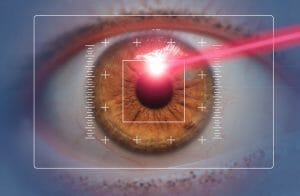If you have been told that contact lenses are not good for you or have trouble wearing contact lenses, your eyes might simply be hard to fit. There’s nothing to worry about, as it doesn’t mean contact lenses are off-limits for you. You just have to know the options suitable for you and find an eye doctor and optician who is an expert in contact lens fitting.
Are Your Eyes Hard to Fit for Contact Lenses?
Following are some of the most common eye conditions that make wearing contact lenses more challenging.
- Astigmatism
- Keratoconus
- Dry Eyes
- Giant Papillary Conjunctivitis
- Presbyopia
- Post Refractive Surgery like LASIK
If you have any of the above-mentioned conditions and you want to enjoy the benefits of contact lenses, visit an eye care professional who can make contact lenses for patients with these eye problems. An optician who specializes in contact lenses is generally more aware of the latest contact lens options and lens technology than an eye doctor.
Contact Lenses For Astigmatism
Astigmatism is corrected by Toric contact lenses. You can get toric lenses in both rigid gas permeable and soft lens materials. Soft lens material is more popular for toric lenses than gas permeable lenses. The main reason for that is that soft lenses are extremely comfortable and don’t need to get used to.
Gas permeable contacts can be used to correct common corneal astigmatism without a toric design. Sometimes, for the unusual type of astigmatism, only gas permeable toric lenses are used.
Finding a perfectly fitting toric soft lens is a challenging task; sometimes, you have to try several toric lenses to get the best fit, comfort, and vision.
For those who have a less common type of astigmatism, custom toric contact lenses are used. These custom-made toric lenses can be more expensive than standard toric lenses, and they take longer to be manufactured.
Hybrid contact lenses are also used for astigmatism correction. They offer the clarity of gas permeable lenses and the comfort of soft lenses.
Contact Lenses For Keratoconus
If you have Keratoconus and glasses, do not get you the clarity of vision you want, switching to contact lenses specially made for irregular corneas might be beneficial for you. These contacts have a smoother, more uniform surface that optically replaces the irregular shape of the cornea to help the retina focus better.
There are several types of contact lenses that can help you see better with keratoconus. Following are some of these types:
Gas Permeable Contact Lenses
Rigid gas permeable contact lenses are usually recommended for mild to moderate keratoconus. The rigid oxygen-permeable material retains its shape on the eye and doesn’t change its shape according to the cornea’s irregular shape. With this, gas permeable lenses provide you with clearer vision than glasses.
Piggybacking Contact Lenses
Gas permeable lenses may offer sharp vision, but they might not be very comfortable. To deal with this, piggybacking technique is used. In this technique, a gas permeable lens is worn over a soft contact lens. The soft lens cushions the gas permeable lens to make it more comfortable.
Hybrid Contact Lenses
Hybrid lenses have a soft lens material around a rigid gas permeable central zone. These lenses have a larger diameter than regular lenses. This design provides the clarity of GP lenses and wearing comfort of soft lenses.
The gas permeable central zone vaults over the irregular shape of the cornea.
You can get hybrid contact lenses to correct nearsightedness, farsightedness, and astigmatism as well.
Scleral Contact Lenses
Sometimes, an eye with keratoconus has a bulging surface on the cornea, making it hard for the regular lenses to stay in the center. To cope with this condition, a rigid gas permeable contact lens with a large diameter, known as a scleral contact lens, is used.
Scleral lenses provide a perfect fit, but they are also more comfortable than the usual contact lenses as they don’t put any pressure on the corneal tissue.
Soft Contact Lenses for Keratoconus
Soft contact lenses can be custom-made to correct mild keratoconus. These contact lenses are more comfortable than hybrid or gas permeable contact lenses for people with irregular corneas.
Soft contact lenses for keratoconus have a larger diameter than normal soft lenses. They also have a higher water content than other contacts.
Contact Lenses For Dry Eyes
Dry eyes are one of the most common eye problems. It makes wearing contact lenses highly uncomfortable, and they worsen the condition. Symptoms of common dry eye include:
- Red and irritated eyes
- Watery eyes
- A scratchy sensation in your eye
It sounds rather ironic that dry eyes make your eyes watery. The overproduction of tears is a defensive mechanism against irritation. However, these tears don’t have the mucous and oils found in normal tears.
Soft lenses specially designed for dry eyes are available to avoid discomfort due to contact lenses. These contacts retain moisture in the eyes, offering more wearing comfort.
Some contact lens experts recommend gas-permeable contact lenses for dry eyes as well. These lenses don’t absorb moisture from your eyes like soft contacts, and they are smaller in size as well, which causes less discomfort in case of dry eyes.
Mostly, eye care practitioners recommend treating dry eyes before you start wearing contact lenses again. The treatment could be artificial tears and eye drops that help produce more tears or supplements for eye nutrition.
Contact Lenses For Giant Papillary Conjunctivitis
It is an inflammatory reaction caused by proteins in tears. It makes lid glands give off substances that create a coating on the lens, causing vision problems and discomfort.
There are several contact lens options available for those who have Giant Papillary Conjunctivitis. Many eye care practitioners recommend soft daily disposable contact lenses as you dispose of them after one day’s use. With one-day contacts, protein doesn’t have much time to be accumulated on it.
On the other hand, gas permeable lenses can also be used in the case of GPC. With gas permeable lenses, proteins don’t get glued to it as easily as soft lenses. Therefore, gas permeable remain clean for a long time which reduces the risk of an allergic reaction. However, you will have to clean them every day to keep them clean of residue. Gas permeable lens material is generally better than soft lens material.
Contact Lenses For Presbyopia
Monovision and bifocal contact lenses are suitable for people with presbyopia. Bifocal or multifocal contacts have a complex design to provide a perfect fit. Finding a precise fitting contact lens can be more time-consuming and expensive than normal contact lenses.
The same goes for monovision contact lenses. However, the benefits of these contracts are worth the time and expense.
There has been a number of advances in multifocal contacts in recent years, which have resulted in increased satisfaction of the customers.
Contact Lenses After LASIK
LASIK doesn’t always give 100% results, and sometimes, another surgery is out of the question, so in that case, you might want to start using contact lenses.
If you have very high astigmatism before LASIK, you might benefit from toric contact to correct mild astigmatism that may remain even after the surgery. Soft lenses can be useful for that, and specially designed hybrid and gas permeable contact lenses are also a great option.
If you have had LASIK performed to correct one for distance and the other for near, you might have to wear a contact lens on one eye, especially while playing sports or driving at night, so that both can see clearly for distant view.
Contact lenses can also be used to deal with several complications resulting after LASIK—for example, blurry vision from higher-order aberrations. Hybrid and gas permeable contact lenses are the best options for this issue.
Another complication that results after LASIK is excessive glare. This, too, can be solved with hybrid and gas permeable contact lenses. These contacts are the best options if you want sharper night vision than the soft contacts after surgery.




